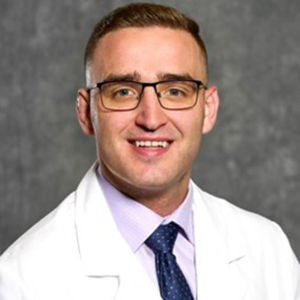Leaders in CV Research Interview: Geoff Barnes, MD, MSc, FACC
Geoffrey D. Barnes, MD, MSc, FACC, is the holder of the James O. Woolliscroft, MD, Department of Internal Medicine Early Career Endowment Award and an associate professor at the Frankel Cardiovascular Center at the University of Michigan. He currently serves as co-director of the Michigan Program on Value Enhancement and Michigan Anticoagulation Quality Improvement Initiative. He leads several National Institutes of Health and Agency for Healthcare Research and Quality-sponsored studies exploring the role of the cardiovascular care team to improve evidence-based anticoagulation care. He also serves on the planning committee of ACC's Emerging Faculty Leadership Academy.
What motivated you to pursue a career in medicine with vascular medicine and cardiology as a specialty?
As a child, I recall listening to my parents' stories as volunteer emergency medical technicians (EMT) and the impact they had on their community. I strove to have a similar impact, first as an EMT and eventually as a physician. I have always been fascinated with how the heart and blood vessels function as an essential part of human existence. During medical school, I became even more enthralled with the vascular system in particular, from the development of peripheral artery disease to the common and often deadly complications of venous thromboembolism. I quickly noticed that cardiovascular specialists had an opportunity to significantly help patients with vascular disorders, but evidence-based therapies were often not being implemented for patients.
Are there any moments you would describe as a "defining point" in your career?
Two moments are defining points in my career. The first was meeting my clinical mentor, Jim Froehlich, MD, MPH, FACC, during my fourth year of medical school. He taught me that highly-skilled clinicians can also be passionate about improving care through health services research. He opened my eyes to the subspecialty of vascular medicine. The second defining point in my career occurred when I met my research mentor, Anne Sales, PhD, RN, FACC. She introduced me to the field of implementation science and helped me articulate my desire to transform cardiovascular care through the empowerment of the cardiovascular care team using implementation science research methods.
Are there any experiences that you feel diversify you as a cardiologist and a member of the ACC?
I love being a member of ACC because we all share a passion for cardiovascular disease but have wide ranging areas of expertise. Many of my closest colleagues within the ACC are members of the ACC's Vascular Disease Section. While we are a relatively small group, we care for a wide range of both common and rare vascular conditions that cardiovascular specialists encounter. Furthermore, ACC's commitment to multidisciplinary care aligns with my belief that cardiovascular care team members are critical to implementing evidence-based care in an increasingly complex health care environment.
As an early career cardiovascular researcher, how would you describe the transition from the role of medical student to researcher? What did that transition look like for you?
Each stage of medical training presented me with new challenges and exciting new opportunities to learn and grow. As a medical student, I was trying to "learn the language" of medicine and how clinicians operate within the hospital and clinic setting. I also began to learn what it meant to conduct health services research by contributing to data collection for a large registry. During my residency, I began to develop my own clinical judgement and ability to make diagnosis and treatment decisions. I also started to see how research could impact the decisions clinicians would make on a day-to-day basis.
As a cardiovascular medicine fellow, I developed deep expertise in the care of patients with cardiovascular disease. During this time, I began to appreciate the impact cardiovascular care teams have on clinical outcomes and realized that most of the research did not focus on how best to organize team-based care. As an early career faculty, I further developed my research skills to match the clinical skills that I had spent the last 8+ years building and refining. Setting aside dedicated time to learn how to conduct health services research through a master's degree program is one of the most important decisions I made. Throughout the process, I listened carefully to my mentorship team to help guide both my clinical and research development.
Do you have any advice for medical students who are aspiring towards cardiology or vascular medicine as a potential specialty?
The road from medical student to independent clinician scientist can be long and have lots of twists, turns, and potholes. Build up some resiliency and have faith in your abilities. Also, surround yourself with a broad team of mentors, sponsors, and peers who believe in you and your ability to impact cardiovascular care delivery.

This interview was conducted by Khristian S. Burke, BS, a medical student at Central Michigan University College of Medicine.
This content was developed independently from the content developed for ACC.org. This content was not reviewed by the American College of Cardiology (ACC) for medical accuracy and the content is provided on an "as is" basis. Inclusion on ACC.org does not constitute a guarantee or endorsement by the ACC and ACC makes no warranty that the content is accurate, complete or error-free. The content is not a substitute for personalized medical advice and is not intended to be used as the sole basis for making individualized medical or health-related decisions. Statements or opinions expressed in this content reflect the views of the authors and do not reflect the official policy of ACC.